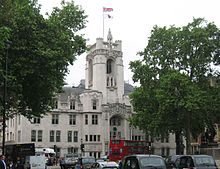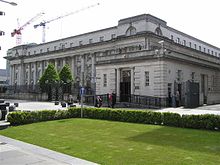Courts of England and Wales
English law means the legal system of England and Wales.
While Wales now has a devolved Assembly, any legislation which that Assembly passes is enacted in particular circumscribed policy areas defined by the Government of Wales Act 2006, other legislation of the British Parliament, or by Orders in Council given under the authority of the 2006 Act. For the most part this will NOT cover legislating for criminal activities.
The essence of English common law is that it is made by judges sitting in courts, applying legal precedent (stare decisis) to the facts before them. A decision of the Supreme Court of the United Kingdom, the highest civil appeal court of the United Kingdom, is binding on every other court. For example, murder is a common law crime rather than one established by an Act of Parliament. Common law can be amended or repealed by Parliament; murder, for example, now carries a mandatory life sentence rather than the death penalty.
Unlike Scotland and Northern Ireland, Wales is not a separate jurisdiction within the United Kingdom. The customary laws of Wales within the Kingdom of England were abolished by King Henry VIII's Laws in Wales Acts which brought Wales into legal conformity with England.
Continue Reading »
Courts of Scotland
The civil, criminal and heraldic courts of Scotland are responsible for the administration of justice. They are constituted and governed by Scots law.
The Scottish Court Service, a non-ministerial department of the Scottish Government, is responsible for the administration of the country's court system.
The Court of Session is the supreme civil court and the High Court of Justiciary is the supreme criminal court.
The High Court is both a court of first instance and also a court of appeal. As a court of first instance, the High Court sits mainly in the former Sheriff Court buildings in the Lawnmarket in Edinburgh, in dedicated premises at the Saltmarket in Glasgow, and also sits from time to time in various other places in Scotland. As a court of appeal, it sits only in Edinburgh.
Appeals may be made to the High Court of Justiciary sitting as the Court of Criminal Appeal from the lower courts in criminal cases. An appeal may also be made to the High Court if the High Court itself heard the case at first instance. Two judges sit to hear an appeal against sentence, and three judges sit to hear an appeal against conviction.
Continue Reading »
Courts of Northern Ireland
The courts of Northern Ireland are the civil and criminal courts responsible for the administration of justice in Northern Ireland: they are constituted and governed by Northern Ireland law.
To overcome problems resulting from the intimidation of jurors and witnesses, the right to a jury trial in Northern Ireland was suspended for certain terrorist offences in 1972, and the so-called "Diplock courts" were introduced to try people charged with paramilitary activities. Diplock courts are common in Northern Ireland for crimes connected to terrorism.
Administration of the courts is the responsibility of the Northern Ireland Courts and Tribunals Service.
Continue Reading »
Supreme Court of the United Kingdom
The main role of the Supreme Court is to hear appeals from courts in the United Kingdom's three legal systems: England and Wales, Northern Ireland, and Scotland. (English and Welsh law differ only to the extent that the National Assembly for Wales makes laws for Wales that differ from those in England, and the two countries have a shared court system.) The Supreme Court acts as the highest court for civil appeals from the Court of Session in Scotland, but the highest appeal for criminal cases is kept in Scotland.
Permission to appeal from the Court of Session is not required and any case can proceed to the Supreme Court of the United Kingdom if two Advocates certify that an appeal is suitable. In England, Wales and Northern Ireland, in contrast, permission to appeal is required, either from the Court of Appeal or from a Justice of the Supreme Court itself.
Continue Reading »


_svg.png)




